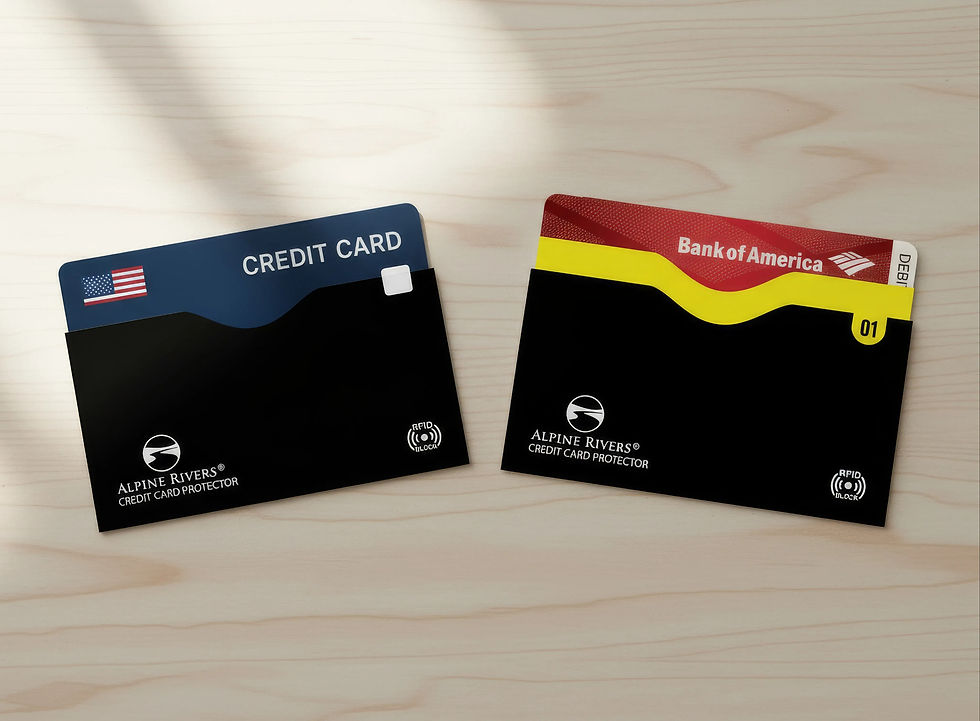Smart US travel ideas (and simple ways to keep cards and passports safer)
- Robin Wright
- Sep 2, 2025
- 3 min read

Intro
Travel doesn’t always mean long‑haul flights. You can find memorable adventures across the United States - from national park road trips to quick city weekends - while keeping your payment cards and ID safer along the way.
Road trips worth a long weekend
Build short loops around Pacific Coast Highway, Blue Ridge Parkway, Zion, or Acadia. Plan fuel stops ahead, keep essentials within reach, and store contactless cards in RFID‑blocking sleeves anytime you’re in dense queues or crowded rest stops.

Staycations with a twist
Check into a boutique hotel downtown, book a neighborhood food tour, or spend a day at a nearby state park. Treat it like a real trip - plan an itinerary, set alerts, and take transit to skip parking hassles.
City weekends and day trips
Pick one theme - architecture walks, indie museums, baseball plus a food hall - and build around it. For crowded subway platforms and event entrances, consider a neck wallet or money belt so your ID, backup card, and cash stay close.

RFID safety 101 (what matters in the US)
What RFID sleeves help with
Sleeves add a physical shield that helps block unauthorized contactless reads of enabled cards and IDs at very close range (think shoulder‑to‑shoulder lines). Use them as a lightweight extra layer alongside good habits (alerts and statement checks). Consumer guidance indicates RFID “e‑pickpocketing” is uncommon relative to other fraud types. AARP Bankrate
What sleeves don’t do
They won’t stop ATM or fuel‑pump skimmers/shimmers, and they don’t prevent large data breaches or card‑not‑present fraud. Inspect readers, cover the PIN pad, and prefer indoor bank ATMs. Federal Bureau of Investigation+1
Why do many travelers still use them
They’re light, inexpensive, and reduce worry in busy spaces - especially when cards live in an outer pocket you access often.

US passports, cards, and airports: quick facts
US e-passports include metallic anti-skimming material and Basic Access Control (BAC), which helps inhibit casual reads when the book is closed. A sleeve is optional for extra peace of mind. State Department Archives+1
Passport card (for land/sea travel to Canada/Mexico/Caribbean) is issued with a protective sleeve to limit reads when not in use. State Department Archives
REAL ID enforcement begins May 7, 2025 for domestic flights. If you don’t have a REAL ID, bring a passport or another acceptable ID. U.S. Department of Homeland Security+1

When to use Alpine Rivers gear
RFID‑blocking sleeves - airport check‑in and security queues, stadium turnstiles, malls/outlets on holiday weekends, rush‑hour transit. Shop RFID‑blocking sleeves
Money belt - long travel days, overnight trains/buses; stash passport, backup card, and emergency cash under clothing. See RFID-blocking money belt
Neck wallet - city weekends and festivals, where you need quick access, hands‑free. See RFID-blocking neck wallet
Practical safer‑pay tips beyond RFID
Prefer tap‑to‑pay or mobile wallets where available; Apple Pay uses a device account number and a transaction‑specific dynamic security code - your real card number isn’t shared with merchants. Apple Support+1
Turn on transaction alerts in your banking app; scan statements weekly.
Keep a backup card stored separately (in a sleeve or your money belt) and a secure copy of key documents.
Why this matters in 2025
US consumers reported $12.5B in fraud losses in 2024—layering simple protections keeps trips smoother. Federal Trade Commission

FAQs
Do US passports need an RFID‑blocking sleeve?
No. US passport books include anti‑skimming material and BAC; a sleeve is optional for extra peace of mind. State Department Archives+1
Are RFID sleeves still useful if I use Apple/Google Pay?
Mobile wallets add tokenization and dynamic codes; keep a physical backup card in a sleeve for merchants that don’t accept mobile pay. Apple Support
What’s the bigger in‑person risk than RFID skimming?
Compromised ATMs and fuel pumps (skimmers/shimmers). Inspect devices and cover your PIN. Federal Bureau of Investigation











Comments